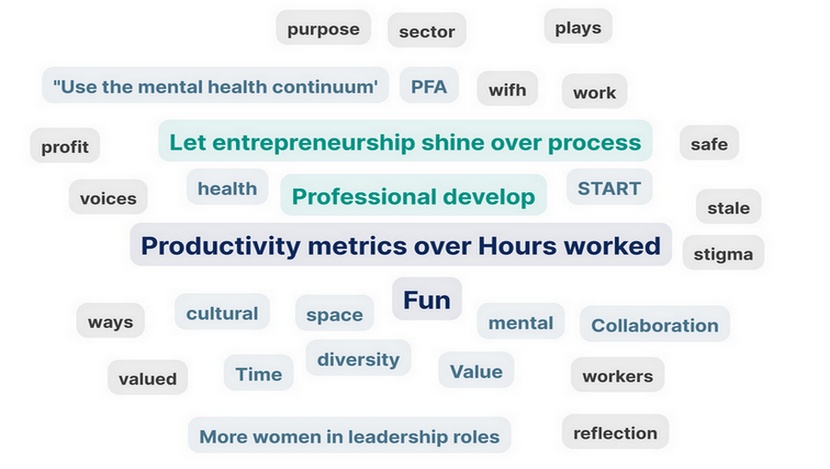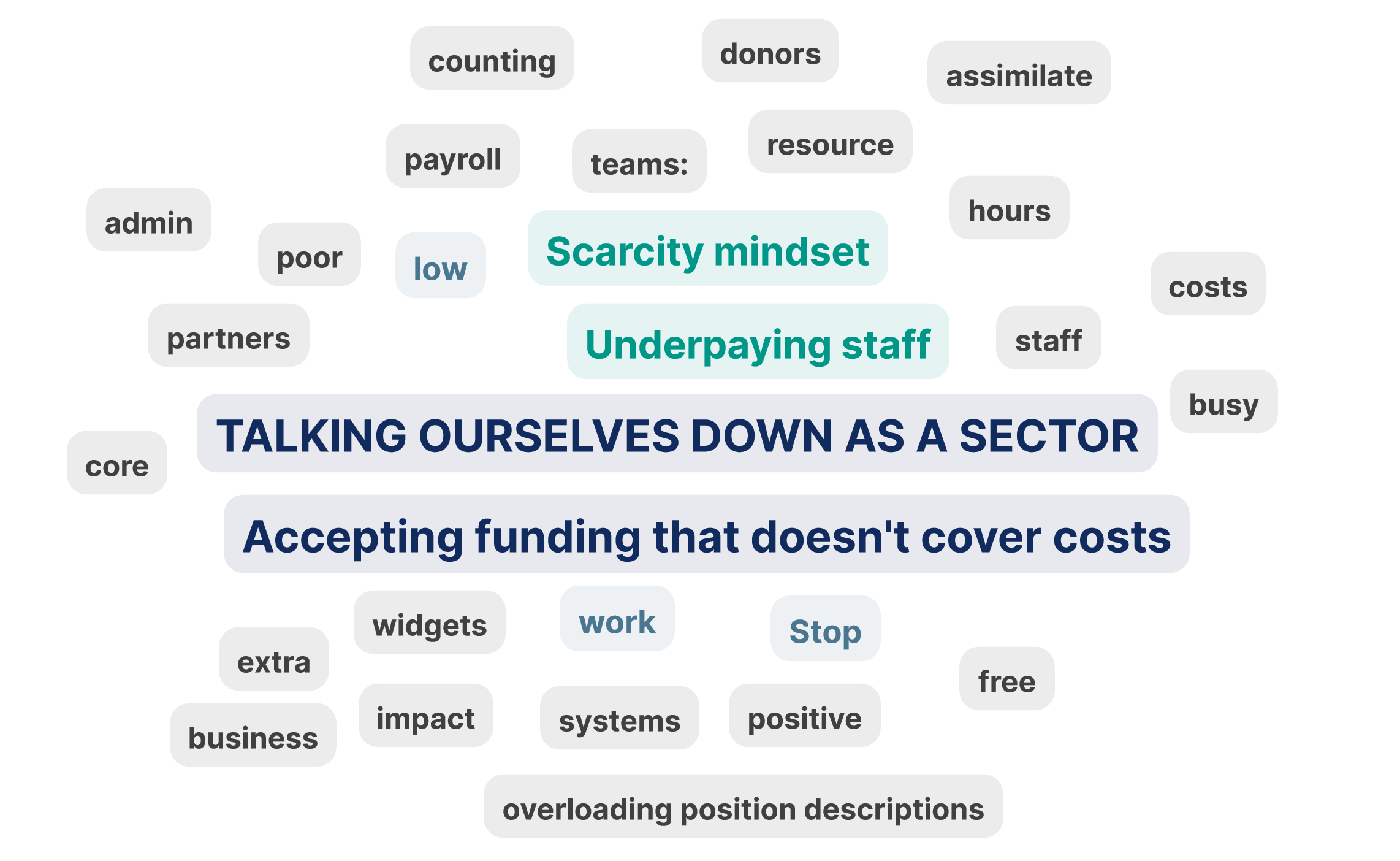Practices, mindset and behaviours to evolve for the social sector - as voted by its leaders
In October 2023, Benefolk hosted an event to ‘Reimagine Resilience’ to launch The Community Well resource hub, and to launch our new name and next chapter.
In addition to hearing from Hon. Andrew Leigh, Minister for Competition, Charities and Dr Catherine Brown OAM, former CEO of Lord Mayor’s Charitable Foundation and Ben Vasiliou, CEO of Youth Projects, attendees were asked to share their voices and take ownership of the practices, mindset and behaviours that they will lead to changes in wellbeing and resilience in the sector.
As part of the event, Benefolk Foundation Director Wendy Scaife asked “What are the three practices that the sector should START to enhance sector wellbeing and resilience, and the three practices the sector should STOP to improve wellbeing.” Attendees were asked to consider the issue in their own practice as leaders, in their organisation and then as a collective.
The energy in the room was electric as leaders from charity CEOs to grantmaking foundation CEOs, peak body CEOs and Mental Health Commissioners commented and upvoted each other’s responses in real-time.
Attendees were invited to not only share their views, but also choose one action from the discussion that they would implement that week in their organisation – leading to hundreds of small but mighty steps toward a healthier, more sustainable future.
The word cloud’s below highlight the most common words that were used and the action that was most supported, through live upvoting using SLIDO.
The full list of suggestions to START and STOP is also reproduced below, verbatim. Taken together, these are commitments that could be developed further again around the key practices, mindset and behaviours that we urgently need to adopt as a sector.
For Benefolk CEO, Julia Keady, the one that resonates most is “start making wellbeing a system issue not an individual issue”.
“It’s a tough call, but I continually see and hear our sector’s mental health and wellbeing being relegated to being about better self-care, that people “give too much of themselves”. It’s far more than that – but that’s for another time”, she said.
So how can we change perceptions and take practical action?
Firstly, continue having the discussion – print the list of responses and talk about it as a team – both management and at your board. Make your own commitments to starting something and stopping something that will move the dial on sector wellbeing and resilience.
Secondly, explore The Community Well – the Social Sector Wellbeing and Resilience Hub. This hub contains more than 100 resources tailored to the social sector, all designed to provide practical advice on how to enhance the wellbeing of our teams and volunteers. Structured around a six-pillar framework, resources range from prevention through policy. The site also contains a range of tools for those wanting to make changes in their organisation, including policies, wellbeing strategy on a page and a guide to advocating for change.
Finally, we know there are organisations doing it well, who are investing in the systems, the processes, the resources – and many others that are taking small steps in the right direction. There’s much more to do as a sector but for now – let’s celebrate and acknowledge the leaders who are governing, monitoring and leading their teams for wellbeing outcomes.
If you need any assistance or want to chat about any of the ideas of issues raised below, book in a chat with our Services team or email hello@benefolk.org.

START
- Start properly valuing the work being done
- Start making wellbeing a system issue not an individual issue.
- Flexible multiyear funding that allows organisations to invest in the systems and programs that prioritise staff well being
- Start an anonymous way for staff to raise with Leadership Team or Board when they are feeling stressed, burnt out throughout the year
- Start making counselling available for all staff.
- Acknowledge, measure and act on mental health and burnout in the sector
- Start having grants investing in people, ie grants for salaries
- Start advocating finders to offer flexible/untied funds
- Start educating donors transparency on the reality
- Start engaging actively in sector activity to address wage disparities and ensure their reflection in government contract/funding
- Capture meaningful wellbeing data of the people in an organisation: 1) define what is meaningful 2) identify what makes a difference
- Start an EAP for volunteers
- Start making it easier to access mental health support for NFP teams
- Start investing consistently in leadership capability in the important foundations (giving and receiving feedback, coaching, managing conflict)
- Start providing a safe and anonymous ‘in the moment’ place for front line staff to lodge concerns and improve supervision practices
- Start slowing down and moving away from “artificial urgency”
- Start making it okay for staff to feel they don’t have to give everything of themselves to their role
- Start normalising different ways of 'doing work' - taking a day to think, walk, process, read is just as valuable as sitting at the desk, and shouldn't be leave
- Start embracing Dan Pallotta's idea of investing in our organisations for much, much greater impact.
- Start putting people first and recognise that flexibility and structures for wellbeing are in the interests of both staff and beneficiaries
- Start more education (schools/uni) about the depth and scope of the NFP sector - as a valid employment path!
- Start valuing the work and pay what it takes
- Start building the narrative around value of slowing down to build resilience and self-wellbeing across sector
- Start being bold and audacious in our requests to government
- Start focussing on the experiences of people in the sector
- Start including diversity as a 'skill' within the sector
- Start building redundancy in budgets to allow for leave and set the expectation for leave
- Start investing in normalising things that don't work. We are always concerned about failure
- Join the UNs next step around SDG’s which is a focus on IDGs - Inner Development Goals. Without character and resilience, the SDGs will not be met.
- Start advocating to make sure government and the community understand that the charity sector is Australia’s safety net. Value the skills and contribution in the sector.
- Regardless of how much we invest of ourselves, there will always be much more to do, so we need to get comfortable switching off when things still need doing
- Start funding for skilled entry level roles (internships) to provide fair opportunities to young people starting out in the sector
STOP
- Stop such exhaustive grant processes that deplete resources and destroy souls. EOIs are great to filter the process and we love thos
- Stop denying our value and demeaning the work
- Stop reporting % of funding that goes to admin as opposed to “program”
- Stop measuring by outputs, productivity, 'efficiency', start measuring by relationships, connection, care, consideration of the future in decisions.
- Stop grant funders restricting use of funds for specific outcomes. Make more funding available for operational costs and team investment.
- Stop normalising lower wages in the sector
- Stop expecting our people to innovate, or do more, on top of their existing, sometimes exhausting jobs. Provide space, time, and investment for innovation.
- Stop underfunding projects and core operations
- Stop accommodating and saying no to help establish clear boundaries
- Stop letting the donor tail wag the strategic dog
- Stop onerous grant applications and wasting resources
- Stop letting government ask the sector to bend over backwards, tender changes, updates
- Stop adopting rigid employment practises that promote and reward the status quo rather than diverse leadership
- Stop being a slave to government, having to chase funding
- Stop accepting that it is ok for philanthropic organisations to decline to provide feedback to us when our grants applications are unsuccessful
- Stop expecting impact reporting in too short a timeframe
- Stop normalising a scarcity mindset in our sector
- Stop discounting the cost of providing services in order to get funding
- Stop accepting contracts that don’t pay enough
- Stop being proud of “running on the smell of an oily rag”
- Stop employing people and expecting them to be 100% from day one. Let them be 60% and build up to it!
- Stop making the third sector not attractive to work in because of the BS around wages
- Stop normalising overworking as valuable as sitting at the desk, and shouldn't be leave
- Stop putting everyone else first
- Stop complex acquittal processes
- Stop saying we are ok when we are not
- Stop agreeing to do everything. Leaders need to look at the operational impact of new activities
- Stop using language that reinforces stereotypes and negative self-worth
- Stop being so traditional with recruitment - look at innovative ways to recruit





